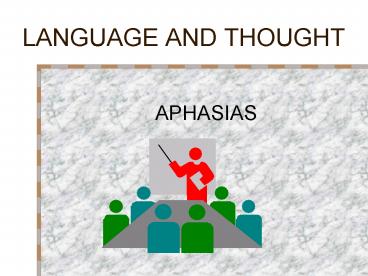LANGUAGE AND THOUGHT - PowerPoint PPT Presentation
1 / 21
Title:
LANGUAGE AND THOUGHT
Description:
Odd intonation 'Telegrammatic' Few or no function words/inflections. Words repeated ... Normal intonation. Stereotyped phrases. Circumlocutions ... – PowerPoint PPT presentation
Number of Views:76
Avg rating:3.0/5.0
Title: LANGUAGE AND THOUGHT
1
LANGUAGE AND THOUGHT
- APHASIAS
2
APHASIA - DEFINITION
- A language disorder resulting from brain damage,
which affects a person's ability to produce or
understand grammatical and semantic structure.
(CRYSTAL, 1987) - DYSPHASIA is an alternative, but little used,
name.
3
LANGUAGE AND THE BRAIN
4
APHASIC SPEECH From Goodglass and Geschwind 1976
- 1. A BROCA'S APHASIC EXPLAINS WHY HE CAME TO
HOSPITAL FOR DENTAL SURGERY - Yes.. ah.. Monday.. er.. dad.. and Peter H..
his name and dad.. er.. hospital.. and ah..
Wednesday.. Wednesday, nine o'clock.. and oh..
Thursday.. ten o'clock, ah doctors.. two.. and
doctors.. and er.. teeth.. yah.
5
KITCHEN SCENEoften used in studies of aphasic
speech
6
APHASIC SPEECH (Cont.) From Goodglass and
Geschwind 1976
- 2. A WERNICKE'S APHASIC DESCRIBES A PICTURE OF A
KITCHEN SCENE - Well this is.. mother is away here working her
work out o'here to get her better, but when she's
looking in the other part. One their small tile
into her time here. She's working another time
because she's getting, too.
7
APHASIC SPEECH (Cont.) From Geschwind 1965
- 3. A CONDUCTION APHASIC ASKED TO REPEAT THE WORD
PRESIDENT - I know who that is - Kennedy
8
TYPES OF APHASIA
- 1. BROCA'S
- DAMAGE - Broca's area
- DEFICITS
- Hesitant broken speech
- Use of syntax in comprehension
- 2. WERNICKE'S
- DAMAGE - Wernicke's area
- DEFICITS
- Comprehension
- Semantic Organisation
9
TYPES OF APHASIA (Cont)
- 3. CONDUCTION
- DAMAGE
- Arcuate Fasciculus
- DEFICITS
- Repetition of words
- 4. WORD DEAFNESS
- 5. ALEXIA (Usually with AGRAPHIA)
- 6. GLOBAL APHASIA
10
APHASIC PRODUCTION
- 1. BROCA'S
- Non-fluent
- One word/syllable at a time
- Difficulties with articulation
- Odd intonation
- Telegrammatic
- Few or no function words/inflections
- Words repeated
11
APHASIC PRODUCTION
- 2. WERNICKE'S
- Fluent - sometimes superfluent
- No articulatory problems
- Normal intonation
- Stereotyped phrases
- Circumlocutions
- Unintelligible words (hence Jargonaphasia)
- Errors in word/phoneme selection
12
CARAMAZZA ZURIF (1976)
- Broca's, Wernicke's, and Conduction Aphasics
- Given a sentence - say which of two pictures it
describes.
13
CARAMAZZA ZURIF (1976) Four types of sentence
- The girl is kicking the green ball.
- (CONTROL - simple agent-action-object sentence).
- The apple that the boy is eating is red.
- (SEMANTICALLY CONSTRAINED - apples don't eat
boys) - The cow that the monkey is scaring is yellow.
- (REVERSIBLE - cows can scare monkeys)
- The horse that the girl is kicking is brown.
- (IMPROBABLE - horses more likely to kick girls)
14
CARAMAZZA ZURIF (1976) RESULTS
- 1. Agrammatic Aphasics (Broca's and Conduction)
performed WELL on control and semantically
constrained sentences, but AT CHANCE LEVEL (50
correct) on reversible and improbable sentences. - 2. Wernicke's Aphasics performed FAIRLY BADLY on
all 4 types of sentence.
15
OTHER SENTENCE TYPES THAT AGRAMMATIC APHASICS
HAVE DIFFICULTY WITH IN THE ABSENCE OF SEMANTIC
CUES
- 1. DATIVE (Heilman and Scholes, 1976)
- He showed her baby the pictures
- VS He showed her the baby pictures
- 2. PASSIVE (Schwartz, Saffran and Marin, 1980)
- The boy followed the girl
- VS The boy was followed by the girl.
16
HAVE AGRAMMATICS LOST SYNTAX?
- Agrammatics have NOT lost all syntactic ability.
They are GOOD in a sentence classification task
that cannot be done on the basis of meaning
(Linebarger, Schwartz Saffran, 1983), e.g. - He came to my house at six o'clock
- VS He came my house at six o'clock
- Remember, however, that they ARE bad on the
picture pointing task.
17
POSSIBLE REASONS
- 1. Agrammatics don't know how meaning can be
derived from syntax. - 2. Agrammatics have to trade off use of syntax
against use of semantics.
18
CAPLAN, BAKER DEHAUT (1985)
- A closer look at the range of deficits in
agrammatics reveals a more complex pattern. - Several factors contribute to agrammatics
difficulties - non-canonical word order
- number of arguments per verb
- number of verbs per sentence
- Some patients have more difficulty with one type
of sentence than with another.
19
COMPUTING SENTENCE STRUCTUREDURING COMPREHENSION
(PARSING)
- WHY? - because meaning depends on structure (as
Caramazza Zurif showed) - HOW?
- Look up syntactic categories of words (NOUN,
VERB, PREPOSITION, DETERMINER etc) in mental
dictionary. - Use phrase structure rules to analyse strings of
words into sentences.
20
PARSING (Cont)
- PROBLEM - what to do when there is more than one
possibility - e.g. After he had called his mother....
- .....she went to the shops
- .....went to the shops
21
PARSING AMBIGUITYTHREE POSSIBLE SOLUTIONS
- 1. Don't make a decision unitl you hear the rest
of the sentence - don't build any structure. - 2. Don't make a decision, but build both
structures. - 3. Make a decision -build just one structure,
EITHER - (a) the simplest (Frazier Fodor, 1978) OR
- (b) the one with the most plausible meaning
(Crain Steedman, 1985)






























![Download [PDF] Declarative Language Handbook: Using a Thoughtful Langu PowerPoint PPT Presentation](https://s3.amazonaws.com/images.powershow.com/10083589.th0.jpg?_=202407230510)
![Read [PDF] Declarative Language Handbook: Using a Thoughtful Language PowerPoint PPT Presentation](https://s3.amazonaws.com/images.powershow.com/10083591.th0.jpg?_=202407230510)